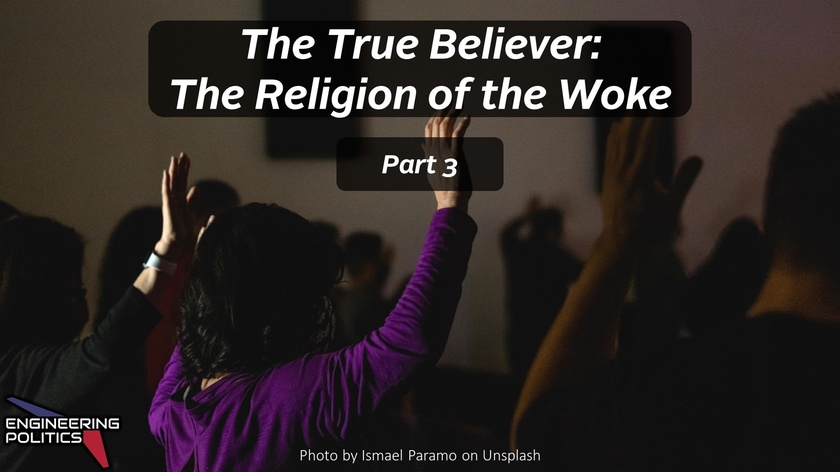
The next group of potential converts is misfits. Not fitting into society, or not seeing yourself as fitting into society, is fertile grounds for frustration. Hoffer writes:
“The frustration of misfits can vary in intensity. There are first the temporary misfits: people who have not found their place in life but still hope to find it. Adolescent youth, unemployed college graduates, veterans, new immigrants and the like are of this category. They are restless, dissatisfied and haunted by the fear that their best years will be wasted before they reach their goal… The permanent misfits are those who because of a lack of talent or some irreparable defect in body or mind cannot do the one thing for which their whole being craves. No achievement, however spectacular, in other fields can give them a sense of fulfillment… The most incurably frustrated – and, therefore, the most vehement – among the permanent misfits are those with an unfulfilled craving for creative work.”
The woke has attached itself to many groups in this category. The young are easy targets due to lack of real world experience. The ever-growing unemployed, or unemployable, college graduate are perfect for wokeism considering the institutions they earned their degrees from are overrun with wokeism. The modern-day university, in most cases, acts as a physical church for the religion of the woke. Veterans are not as attracted to wokeism, but they are certainly attracted to the opposing mass movement (I will expand on this at the end of the piece). New immigrants, depending on where they are coming from, are also more impressionable when coming to a new land and are trying to assimilate. The woke claim to stand against “assimilation,” but what they really mean is they want everyone to keep on the mask of their culture while assimilating the political and social ideals of wokeism. The permanent misfits, especially those of the artistic mind, are exposed to the holy cause of wokeism as well. The reason for this is already pretty thoroughly covered when talking about the ‘creative poor’. Hitler thought of himself as a creative person and painted many works of art, although objectively poor art, that most likely contributed to frustration towards his own inadequacies that he then projected into his own mass movement.
The inordinately selfish are, well, exactly what the name implies. These people are particularly susceptible to frustration because they are more critical of their own shortcomings, and, therefore, must project virtue and tolerance to the world to fill the void. Many of these people are less targeted by the woke than they openly pursue woke acceptance. Examples include Hollywood actors, entertainers, athletes, authors, members of the media, and public intellectuals. Author Robin DiAngelo is a perfect example of this personality.
The ambitious facing unlimited opportunities encounter frustration when they believe the actions available to them in their own limited capacity will not make a dent in the work that must be done to fix the world. These people look to power in a collective group to create maximum impact. Not only does the woke pursue these types of people, but they often become the most effective mouthpieces advocating for the mass movement. Greta Thunberg – fighting climate change by advocating for radical changes in energy policy – is a perfect example of this personality.
Minorities, more specifically minorities on the extremes of culture and economic success, are likely to become frustrated at the system that helped them thrive or fall. This happens for two reason: (1) they see the other minorities around them not achieving the same success or failure, or (2) they still see themselves as an “outsider” even considering their achievements or failures. The former reason is what wokeism deals in most, and the latter reason can authentically justify frustration at a system that exists in a rigid hierarchy. The problem is the woke claim both cases are prevalent because of systemic discrimination against that minority even when it may be the discrimination of just one individual or no actual discrimination causing the disparity. This is how you get Oprah talking to Meghan Markle about how oppressed the former Duchess of Sussex was during her time as a royal.
The bored is another group predisposed to frustration. As Dr. Jordan Peterson points out, “boredom is a symptom of excess order.” Hoffer writes:
“When people are bored, it is primarily with their own selves that they are bored. The consciousness of a barren, meaningless existence is the main fountainhead of boredom… The differentiated individual is free of boredom only when he is engaged either in creative work or some absorbing occupation or when he is wholly engrossed in the struggle for existence.”
People who suffer from a lack of meaning in their lives can find meaning in a mass movement, especially a religious one. The religion of the woke is the perfect temporary substitute for a meaning crisis, something the entire western world is going through right now. Generations who have not experienced mass war or life-threatening turmoil in their lifetimes will find themselves in this position. A culture or society in stagnation or decline will also produce a bored population. Bored people tend to focus on causes they do not actually care about and/or turn to nihilism. Wokeism thrives on nihilism and meaninglessness.
The last group is the sinners. The woke take an interesting path towards converting the sinners that runs very opposed to traditional religion that might even surprise Hoffer himself. Hoffer writes:
“An effective mass movement cultivates the idea of sin… To confess and repent is to slough off one’s individual distinctness and separateness, and salvation is found by losing oneself in the holy oneness of the congregation.”
The quote above can easily characterize a traditional religion, but there is a central tenant wokeism leaves out of its doctrine – repentance. I talked about this shortly in the introduction when differentiating between a healthy and corrupt religion, but I do not believe Hoffer made that distinction because he never witnessed wokeism. Wokeism believes in the idea of original sin but much less in the idea of ‘the sinner’. Original sin to them is whiteness or colonialism or toxic masculinity. Even though they do believe that one, without inheriting these original sins at birth, can commit them later in life, it is more through perpetuation of the idea of that sin than an actual, explicit offense. For example, a black man, who may have inherited the original sin of ‘toxic masculinity’, can also perpetuate ‘whiteness’ if he does not agree with a woke principle. Wokeism also finds no need to accept repentance for a sinner’s salvation, only blind obedience as an ‘ally’ until death where they might be accepted as a woke saint or slandered as some who did not believe in the right things hard enough. Even if an ally had the privilege of dying a woke saint, chances are if a statue was erected in their honor, it will be torn down by the woke within the next 5 years.
Thank you for reading, but due to the length of this piece, I need to split it into parts. The next part will be coming shortly. Also, I plan on releasing these in the Engineering Politics Locals Community a week or so before I republish them on Medium. This way the members of this community get to see it first. I really appreciate your support because this type of content takes some time and a lot of thought to produce. I will also do a podcast covering this material shortly after it is completed. Thanks again!

I was listening to some news updates when I heard this CNN clip about the potentially hazardous water in East Palestine, and as soon as I heard her ask the question about whether or not her guest would drink the water, I IMMEDIATELY thought of this clip from South Park. Enjoy.
In this special episode of The Engineering Politics Podcast, Truman from Return To Reason is back for a new video and podcast series titled ‘Revisiting The Road To Serfdom’ where we review F.A. Hayek’s classic work, The Road To Serfdom. This episode covers ‘Chapter 15: The Prospects of International Order’.
This will be an ongoing series that covers the entire book. We put a ton of work into making this insightful and relevant, so we hope you enjoy watching/listening as much as we enjoyed reading and recording.
Become a subscriber of the Engineering Politics Locals Community to support this content. Also, consider joining the @ReturnToReason Locals Community to show Truman some support.
In this episode of The Engineering Politics Podcast, I team up with Truman from @ReturnToReason to interview one of the most intelligent and influential creators in the space of philosophy today. Stephen R.C. Hicks is a Professor of Philosophy at Rockford University, Executive Director of the Center for Ethics and Entrepreneurship, and Senior Scholar at The Atlas Society. He has written many books including Explaining Postmodernism and Nietzsche and the Nazis. We bring him on to talk about the social and political issues we are currently facing in America, and the West more broadly, and what the collectivist ideas of Jean-Jacques Rousseau might have to do with it.
Become a subscriber of the Engineering Politics Locals Community to support this content. Also, consider joining the @ReturnToReason Locals Community to show Truman some support.
In this special episode of The Engineering Politics Podcast, Truman from Return To Reason is back for a new video and podcast series titled ‘Revisiting The Road To Serfdom’ where we review F.A. Hayek’s classic work, The Road To Serfdom. This episode covers ‘Chapter 15: The Prospects of International Order’.
This will be an ongoing series that covers the entire book. We put a ton of work into making this insightful and relevant, so we hope you enjoy watching/listening as much as we enjoyed reading and recording.
Become a subscriber of the Engineering Politics Locals Community to support this content. Also, consider joining the @ReturnToReason Locals Community to show Truman some support.
In this episode of The Engineering Politics Podcast, I team up with Truman from @ReturnToReason to interview one of the most intelligent and influential creators in the space of philosophy today. Stephen R.C. Hicks is a Professor of Philosophy at Rockford University, Executive Director of the Center for Ethics and Entrepreneurship, and Senior Scholar at The Atlas Society. He has written many books including Explaining Postmodernism and Nietzsche and the Nazis. We bring him on to talk about the social and political issues we are currently facing in America, and the West more broadly, and what the collectivist ideas of Jean-Jacques Rousseau might have to do with it.
Become a subscriber of the Engineering Politics Locals Community to support this content. Also, consider joining the @ReturnToReason Locals Community to show Truman some support.
In this special episode of The Engineering Politics Podcast, Truman from @ReturnToReason is back for a new video and podcast series titled ‘Revisiting The Road To Serfdom’ where we review F.A. Hayek’s classic work, The Road To Serfdom. This episode covers ‘Chapter 14: Material Conditions and Ideal Ends’.
This will be an ongoing series that covers the entire book. We put a ton of work into making this insightful and relevant, so we hope you enjoy watching/listening as much as we enjoyed reading and recording.
Become a subscriber of the Engineering Politics Locals Community to support this content. Also, consider joining the @ReturnToReason Locals Community to show Truman some support.














